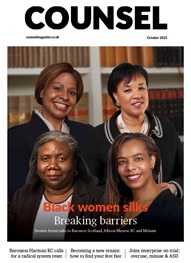*/
The Chief Executive of the Bar Council of England and Wales, the Chairman of the Bar Human Rights Committee of England and Wales and the President of the Law Society of England and Wales expressed their deep concern at reports of mass trials being held in Iran following the political unrest after the disputed June presidential elections.
The fourth mass trial in Tehran’s Revolutionary Court began yesterday where over 100 people have been accused of crimes including rioting, vandalism, “acting against national security”, and conspiring against the ruling system.
Those on trial include members of the opposition reform movement, including a former vice-president and other senior politicians. Two Iranian workers for the British and French embassies in Tehran, a French academic and an Iranian-Canadian reporter were also among those on trial.
This is the latest in a series of moves which threatens to undermine Iran’s credibility for upholding international standards for the rule of law and fair trial procedures.
Reports indicate that lawyers representing the defendants have been denied access to their clients, to prosecution case documents and to knowledge of the dates of the trials. If these allegations are true, Iran is failing to meet their international obligations under the International Covenant for Civil and Political Rights1 . In particular, defendants have a right to an adequate defence. This includes not only the right to be assisted by a lawyer, but also to have all the elements of evidence at one’s disposal, including access to case materials. This right constitutes one of the most fundamental elements of a fair trial. In the interests of justice, the accused is entitled to the minimum guarantees of legal representation.
The signatories to this statement ask the Iranian authorities to abide by their government’s commitment to the rule of law and fair trial procedures. Any trials that take place in Iran must ensure that defendants are guaranteed their fundamental rights. The signatories urge the Iranian authorities to put an end to these trials and release those who have been imprisoned arbitrarily without charge of a specific criminal offence.
1. Iran ratified the International Covenant on Civil and Policitical Rights on 24 June 1975.
Those on trial include members of the opposition reform movement, including a former vice-president and other senior politicians. Two Iranian workers for the British and French embassies in Tehran, a French academic and an Iranian-Canadian reporter were also among those on trial.
This is the latest in a series of moves which threatens to undermine Iran’s credibility for upholding international standards for the rule of law and fair trial procedures.
Reports indicate that lawyers representing the defendants have been denied access to their clients, to prosecution case documents and to knowledge of the dates of the trials. If these allegations are true, Iran is failing to meet their international obligations under the International Covenant for Civil and Political Rights1 . In particular, defendants have a right to an adequate defence. This includes not only the right to be assisted by a lawyer, but also to have all the elements of evidence at one’s disposal, including access to case materials. This right constitutes one of the most fundamental elements of a fair trial. In the interests of justice, the accused is entitled to the minimum guarantees of legal representation.
The signatories to this statement ask the Iranian authorities to abide by their government’s commitment to the rule of law and fair trial procedures. Any trials that take place in Iran must ensure that defendants are guaranteed their fundamental rights. The signatories urge the Iranian authorities to put an end to these trials and release those who have been imprisoned arbitrarily without charge of a specific criminal offence.
1. Iran ratified the International Covenant on Civil and Policitical Rights on 24 June 1975.
The Chief Executive of the Bar Council of England and Wales, the Chairman of the Bar Human Rights Committee of England and Wales and the President of the Law Society of England and Wales expressed their deep concern at reports of mass trials being held in Iran following the political unrest after the disputed June presidential elections.
The fourth mass trial in Tehran’s Revolutionary Court began yesterday where over 100 people have been accused of crimes including rioting, vandalism, “acting against national security”, and conspiring against the ruling system.


Justice system requires urgent attention and next steps on the Harman Review
Q&A with Tim Lynch of Jordan Lynch Private Finance
By Marie Law, Director of Toxicology at AlphaBiolabs
By Louise Crush of Westgate Wealth Management
Why Virtual Assistants Can Meet the Legal Profession’s Exacting Standards
Despite increased awareness, why are AI hallucinations continuing to infiltrate court cases at an alarming rate? Matthew Lee investigates
Many disabled barristers face entrenched obstacles to KC appointment – both procedural and systemic, writes Diego F Soto-Miranda
The proscribing of Palestine Action under the Terrorism Act is an assault on the English language and on civil liberties, argues Paul Harris SC, founder of the Bar Human Rights Committee
For over three decades, the Bar Mock Trial Competition has boosted the skills, knowledge and confidence of tens of thousands of state school students – as sixth-form teacher Conor Duffy and Young Citizens’ Akasa Pradhan report
Suzie Miller’s latest play puts the legal system centre stage once more. Will it galvanise change? asks Rehna Azim